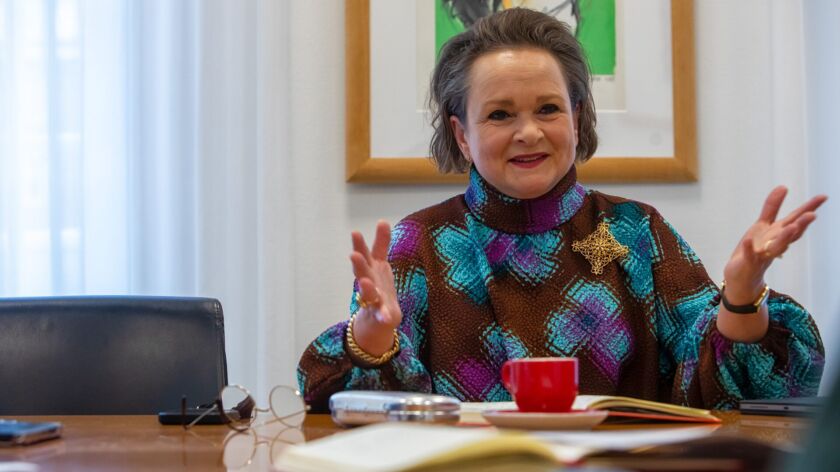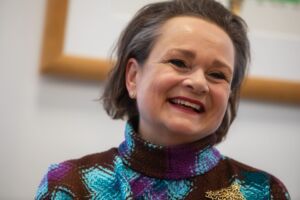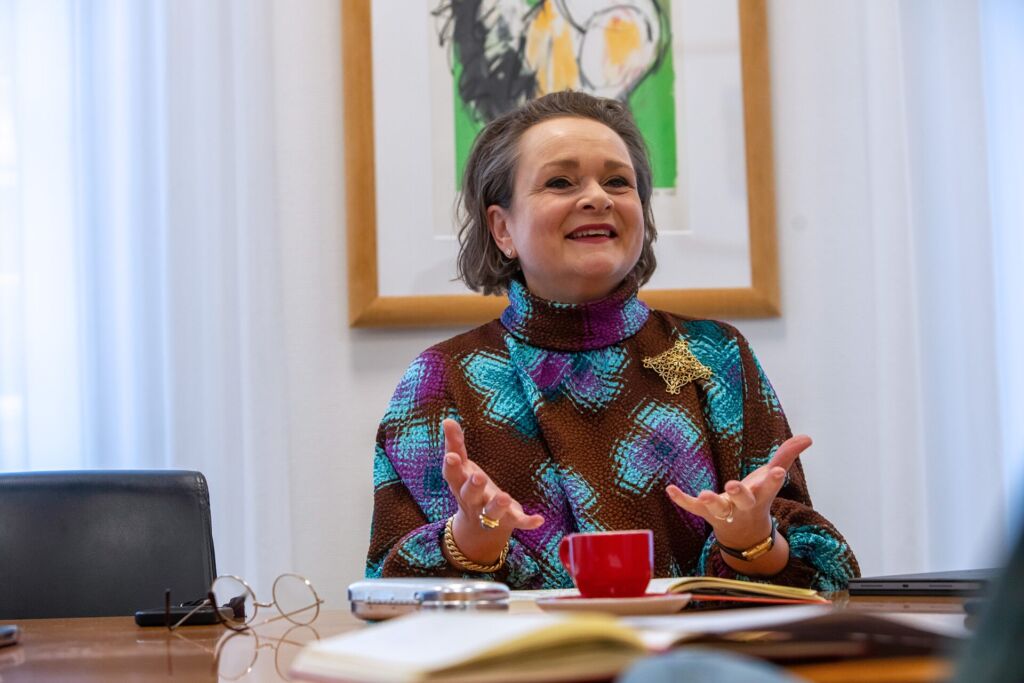Alexandra van Huffelen: ‘We will fight the cuts tooth and nail’
-
 Alexandra van Huffelen. Foto: Dick van Aalst
Alexandra van Huffelen. Foto: Dick van Aalst
She can be impatient at times and is not afraid to take decisive action. Today, Alexandra van Huffelen starts her new job as President of the Executive Board at Radboud University. She dismisses doubts about her political avocation. 'The independence of education and research is paramount.'
Even before Alexandra van Huffelen took her first steps on Radboud University campus as President of the Executive Board, her appointment had caused a stir.
Because Van Huffelen is combining her work in Nijmegen, today being her first official working day, with her appointment as party chair of D66. An impossible combination, critics argue. Just in practical terms: how will you have time to chair a national party as well as the tough job of being President of the Executive Board?
‘My main job is at the university. This is where I will be putting in all the hours needed‘
But there was also substantive criticism: professor of constitutional law Paul Bovend’eert highlighted the risk of political influence. He feels that appointing a prominent political figure as President will jeopardise the university’s independence.
First, the practical side of things. Can this full-time job be combined with a 16-hour-a-week ancillary activity without suffering burnout?
‘I’m used to putting in a lot of hours. I’ve always done that. As secretary of state, I did both kingdom relations and digitisation; two domains that were entirely unconnected. They were two almost full-time jobs.

‘Some people may have thought that I’d only be here three days a week, but obviously that’s not the case. My main job is at the university. That’s where I will be putting in all the time and hours needed. And it’s common to have ancillary positions. I assume – as does the Supervisory Board – that they will not compromise my work here.
‘When I board the train to Nijmegen in Utrecht, my working day begins. And that lasts until late at night. I don’t usually work on Saturdays, but I do work on Sundays.’
Are you a workaholic?
‘I just like working. I enjoy other things too, but I don’t mind working a lot.’
But doesn’t Paul Bovend’eert’s substantive criticism make sense though?
‘I am hugely committed to the independence of education and research. That is paramount. Paul Bovend’eert said what he said. I will be careful not to let the two roles get in each other’s way.’
Bovend’eert indicated that the Executive Board has a fairly direct influence on education and research these days. Is influence through that route ruled out?
‘There just shouldn’t be any political influence. I have a background and ideas, but they don’t matter in this context. If a scientist wants to do research, that’s up to them. That has to be done within the structures we have in place at the university. As far as I am concerned, everything is watertight in that respect, but fortunately there is also a Supervisory Board to monitor everything.’
Will you remain as President of Radboud University for four years whatever happens?
‘Yes. The appointment is for four years with the possibility of renewal thereafter. That is the intention of both sides.’
Graffiti on the wall
On this Wednesday afternoon, Alexandra van Huffelen’s office still looks quite empty. An unplugged monitor sits prominently on the large conference table; a painting by her predecessor still hangs on the wall. She has yet to add her own personal touch.
‘The university wants to make more impact. That appeals to me enormously’
The sound of a pressure washer can be heard in the background. Outside, right next to the Executive Board office, a cleaner is busy removing red graffiti from a wall. The words ‘cut ties’ are still visible. It’s as if the pro-Palestinian activists knew that the new President would be in her new office today and wanted to highlight their main demand in advance.
Why did you want to work at a university?
‘I am passionate about education and research. This is a broad university which educates young people and where very good and fundamental scientific research is conducted. This university is looking for ways to make even more of an impact. That appeals to me enormously.
‘In the interviews, I met a lot of people who are passionate about their profession. Student satisfaction is very high, the university has an international character and roots that make me excited to work here.’
5 facts about Alexandra van Huffelen
How well do you already know the university?
‘A bit. I’ve been here a few times and I’ve also cycled around the campus. The introductions will be happening soon. I have a good onboarding programme – there’s a University Joint Assembly meeting on Monday.’
The university needs to make substantial cuts. Do you see that as your biggest challenge as President?
‘It’s going to be a formidable challenge. In the coming period, we will see which cuts will be going ahead and which won’t – they are yet to be debated in the Senate. Either way, they are very serious cuts. I will work hard to show the seriousness of making such deeps cuts in education and research. Not only does it make it harder to run universities and colleges, but it also jeopardises our knowledge economy.
‘We need to do everything we can to see what cuts can still be reversed. I feel a lot of support from the community here for that. I was at the education protest in The Hague in November and saw many students there as well. We will fight tooth and nail against the government’s cuts. At the same time, we also need to explore how we can best absorb the cuts resulting from falling student numbers.’
How do you plan to save education and research as much as possible?
‘It starts with keeping the cuts as low as possible. You can also try to generate more revenue. Ensuring new funds is important. In general, if you have to make cuts, you need to try to make things more efficient without affecting the heart of the activities. In the coming months, I will need to analyse the situation here. My job is to ensure that the university flourishes and grows and is a place where education, science and impact can continue to grow in a safe environment.’

Safe in what way?
‘That everyone here is free to say what they think without compromising everyone’s perceived safety. Physically, but also in terms of social safety. That provides the basis and the calm environment in which to have robust debates and differences of opinion with each other on substance.’
There have been several cases of inappropriate behaviour at Radboud University in recent years. How will you act against this?
‘I read in the newspaper what happened here. But I also see that the university has an extensive programme (Prevent – Care – Cure, ed.). We will be discussing its progress in the UGV on Monday. We already have codes of conduct and confidential advisors, but we need to ensure a constant dialogue about the issue and take action.’
Last week there was the call to improve the security of Jewish and Israeli students and staff on campus. At the same time, pro-Palestinian activists don’t feel safe on campus either. They say they are shadowed by security guards. How do you feel about that?
‘The Middle East conflict has had a major impact on Dutch society, including universities. I would love to engage with anyone who has an opinion on this, whether they are pro-Palestinian demonstrators or Jewish or Israeli staff and students. I want us to be able to have the debate together, without this being an unsafe place and without vandalism on campus.’
‘I can imagine people feeling impatient’
Do you think Radboud University should sever ties with Israeli institutions?
‘The Executive Board has asked a committee to advise on this. There will also be discussions in which everyone can provide input. We need to wait for the outcome of those measures before taking a sensible and supported decision.’
The advisory committee In Tilburg recommended suspending ties with Israeli universities, but the Tilburg Executive Board has not yet responded. Will you follow the Nijmegen committee’s advice?
‘I feel it is important to first see what the committee comes up with and then discuss together what is sensible. I don’t want to make any predictions.’
Pro-Palestinian protesters consider the advisory committee a delaying technique.
‘I can imagine people feeling impatient. Once they have made their recommendation, we will need to discuss it. I also understand that administrators feel that you have to be careful with such advice. This is a big topic, which affects many people. At the same time, it mustn’t take longer than necessary.’

During demonstrations, slogans are sometimes shouted that some consider antisemitic. Buildings have also been occupied. How much space will Palestinian activists be given under your presidency?
‘There are legal limits in the Netherlands and they apply here, just like freedom of demonstration and freedom of speech. But above all, we need to talk to each other about what makes a good debate.’
What kind of director are you?
‘I am strongly content-driven, I like to understand what we are doing. When it comes to big issues, I think it is important to engage with all parties. At the same time, I love tackling things. I am not into kicking the can down the road and I’m not afraid to take complex decisions with my fellow board members. That’s part of it, even if not everyone is happy about it. What is important is to always be accountable.’
Are you impatient, like your brother said in an interview with the FD?
‘I can be impatient at times, but I also realise that sometimes it’s necessary to take my time.’
In an old interview, you talk candidly about your time as a director at Essent, where you put too much pressure on employees. Have you changed since then?
‘I studied at a time when everyone was full of praise for great CEOs like Jack Welch (former CEO of General Electric, ed.). I applied his method myself, but it turned out not to work. That changed me a lot.
‘I was often the first woman’
‘I’m still ambitious – I ask myself and others to do their very best, but I now know that in a large organisation you can’t solve everything top-down. By doing so, you often achieve the opposite of what you wanted to achieve.’
You previously said you were enthusiastic about the university’s roots. What value do you believe the Catholic tradition of Radboud University has?
‘It’s about emancipatory ideas. That we are a place where many first-generation students come. That’s a nice background.’
Are you religious yourself?
Hesitates. ‘A bit. My mother is Catholic and my father Protestant. I no longer go to church, but I did get married in church. My husband is Catholic. I do recognise that people can draw support from a religion.’
How did getting to know your colleagues on the Executive Board go?
‘We spoke at length with each other. That was very nice. I am proud that we have a board with three women, which is unique for this university. Not entirely unique in the Netherlands, because it’s been the same in Rotterdam since November.’
‘I strongly believe in women’s empowerment. I was often the first woman. For example, I was the first female director of the transport company GVB in Amsterdam and the first female member of government at the Ministry of Finance. In 2020, mind you. Everyone should be given room to grow.’
Is it an advantage or a disadvantage that you still need to get to know the university?
‘I have no idea, we’ll see. It’s how it is. I am used to delving into new worlds very quickly, though. I didn’t know much about public transport when I started at GVB. I hope I’ll soon get to know as many people here as possible.’



